You’ve been planning your BBQ for weeks (getting everyone together isn’t easy), but when the day finally arrives, Mother Nature “blesses” you with a downpour—plans ruined.
Having a covered patio means enjoying your backyard without getting sunburnt in the summer heat or rained on when you’re trying to grill a burger.
But is the price tag worth covering your patio? Let’s break down the costs to find out—
This article will show you:
- A cost breakdown of patio styles and materials.
- Low-cost vs. high-end deck ideas.
- How to build your patio—DIY style.
Read more:
How Much Does It Cost To Build A Covered Patio?
Building a covered patio can cost anywhere from $2,000 to $30,000.
This includes installation and labor costs, which range from $25 to $40 per square foot.
But there’s no one-size-fits-all here, as costs can depend on several factors, such as:
- Size
- Materials
- Location
- Structure
- Accessories
What’s the average cost of a covered patio?
To keep things simple, here’s what you can expect for a standard patio and cover.
If you were to build a wooden pergola patio on a 10×10 space, you’d expect to pay around $2,500.
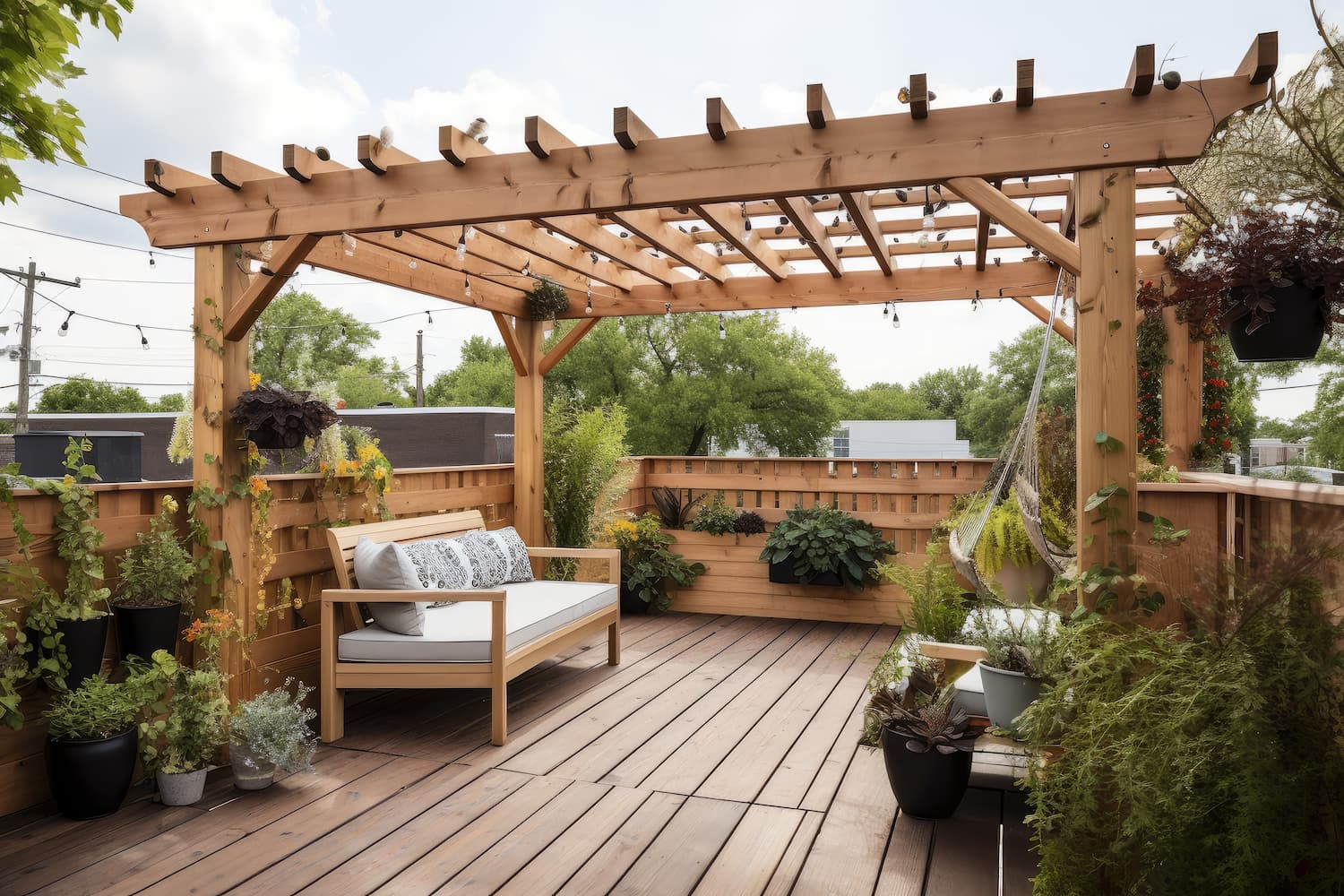
But if you’re looking to splurge on a more expensive glass patio with an awning style—you could be paying up to $9,000 for a 10×20 patio.
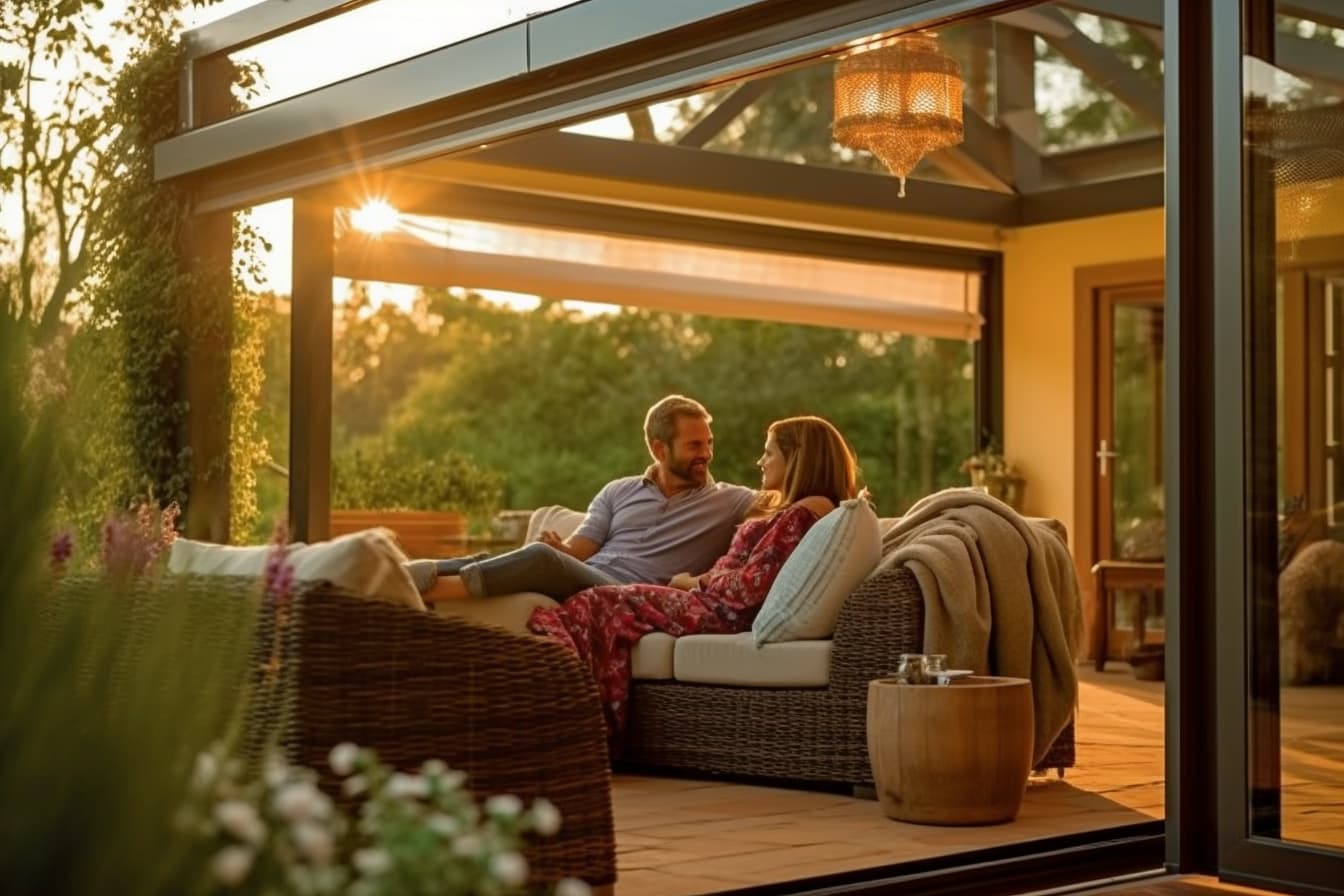
And if you’re going all out with glass materials, a full enclosure, and accessories for a 10×30 space— that’s when you might break the bank and spend up to $30,000 or more.
Here’s a basic summary:
|
Type |
Average costs |
|
Full enclosure |
$9,728–$29,400 |
|
Partial enclosure |
$5,000–$10,000 |
|
Attached to home |
$2,000–$25,000 |
|
Freestanding |
$3,000–$25,000 |
If you want to stick to the minimum $2,000 mark, you can opt for a covered patio attached to the house, as you tend to use fewer materials.
But expect to pay up to $30,000 for a full enclosure as you’ll have to spend more on extra materials, installation, and labor costs (especially if you’re covering a lot of space with pricey materials).
If you need help with your budget before shelling out the cash for an outdoor patio, check out our free budget calculator.
Types of Covered Patios: Cost Breakdown
You may have heard of the terms “pergola” or “louvered”.
No, they’re not the names of fancy cakes, but different styles of patios.
And yes—the style you choose can shape the overall cost and play a big part in the aesthetics of your patio.
Here’s a summary of the popular styles and their average costs for a 12×18 patio:
|
Style |
Average cover costs |
|
Awning |
$1,000–$27,400 |
|
Gabled |
$2,200–$18,900 |
|
Pergola |
$2,500–$11,400 |
|
Louvered |
$4,300–$26,100 |
|
Gazebo |
$9,200–$15,400 |
*including materials and installation
These patio covers also work great for decking, creating some extra shading or adding a good dose of character to your outdoor space.
Find out how much it costs to install garden decking.
Now, back to patio covers—
Awning cover
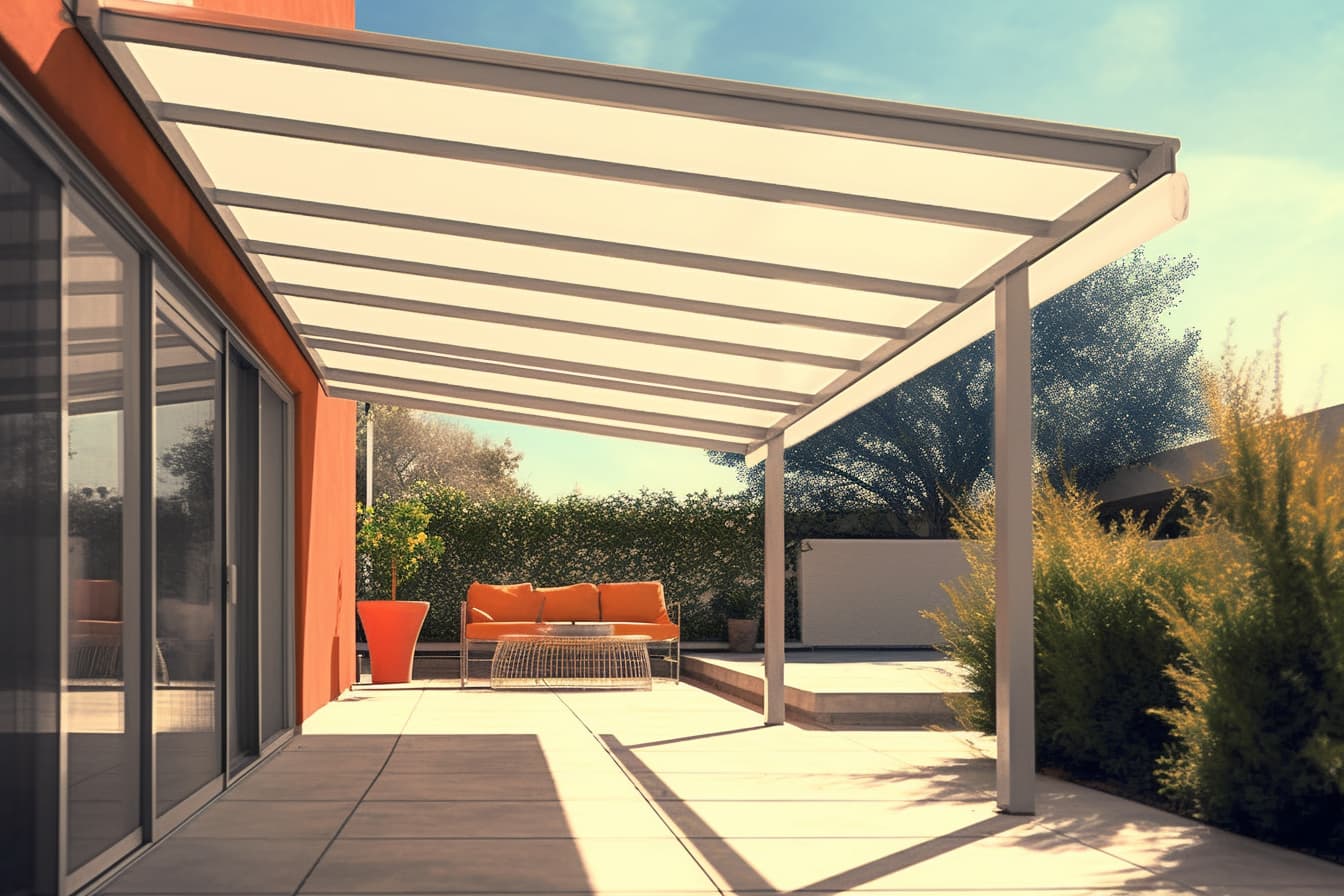
Awning patio covers are perfect for anyone who loves spending time outdoors but prefers to stay protected from the sun and rain.
They’re usually made from materials like fabric, aluminum, or polycarbonate that provide shelter from the elements.
You can expect to pay between $1,000 and $27,400 for an awning patio cover.
Why the price difference?
If you’re on a budget, you’ll use low-cost materials, like fabric, in a much smaller space (think 10×10). But you’ll be coughing up a lot more with a large area and pricey materials, like glass.
When it comes to installation, you can hire a professional or go the DIY route if you’re feeling adventurous.
But be warned—if it’s not installed right, you could have a collapsed cover on your hands, so follow instructions carefully or get help from an expert.
If installed correctly and you decide to sell your home down the line, an awning patio cover can boost your property’s value.
Gabled cover
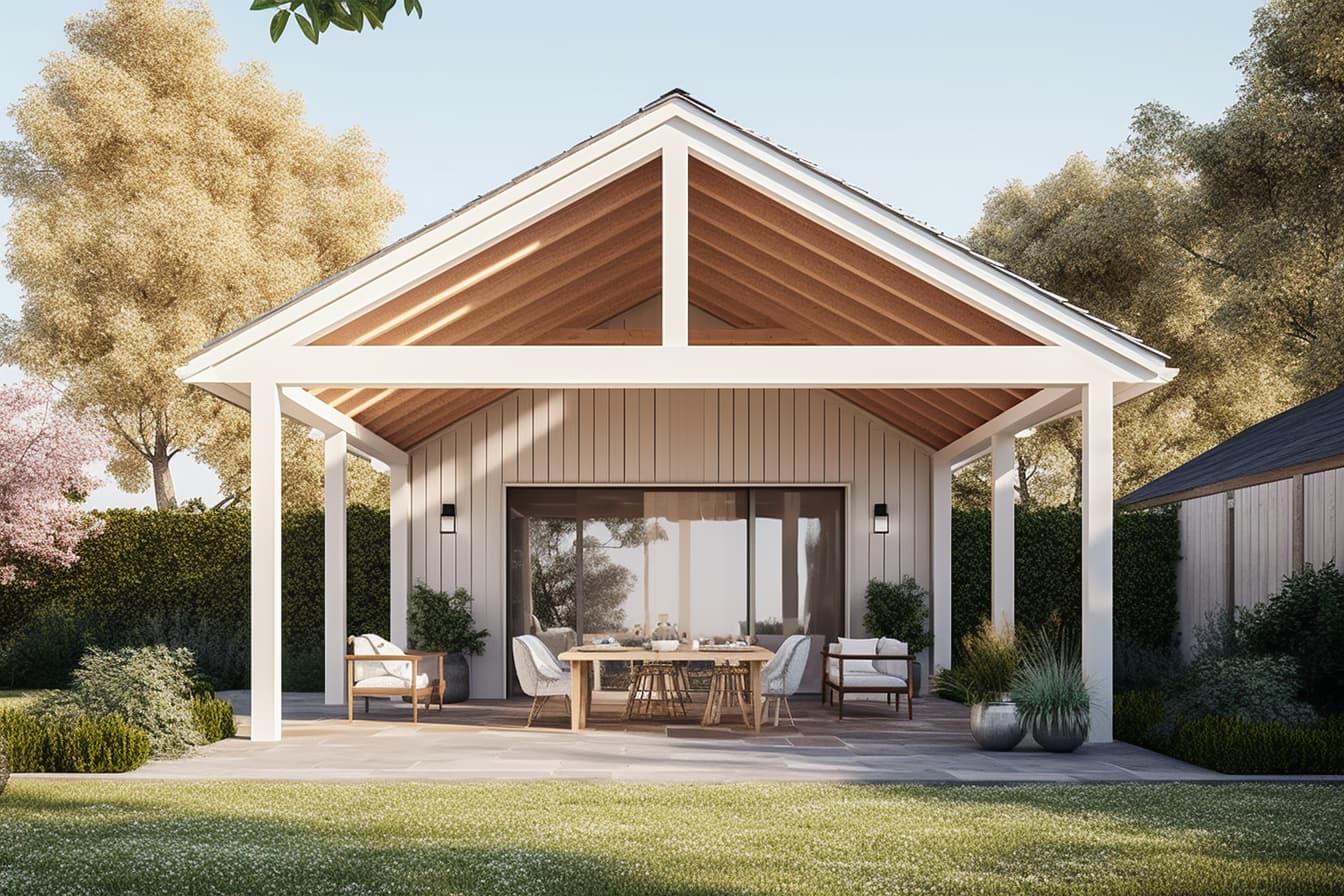
A gabled patio cover features a triangular roof with two sloping sides that meet at a ridge or peak.
The cost can vary between $2,200 and $18,900, with materials like wood, aluminum, and glass all costing more than fabric or vinyl.
Gabled patio covers are popular as they provide natural ventilation and plenty of light.
They’re also known for their aesthetic appeal, with a classic look that can complement most home styles or exteriors.
So, if you want to take your outdoor living space to the next level, consider adding a gabled patio cover to your home. Your neighbors will be green with envy (and you’ll be cool and comfy under your new patio cover).
Pergola cover
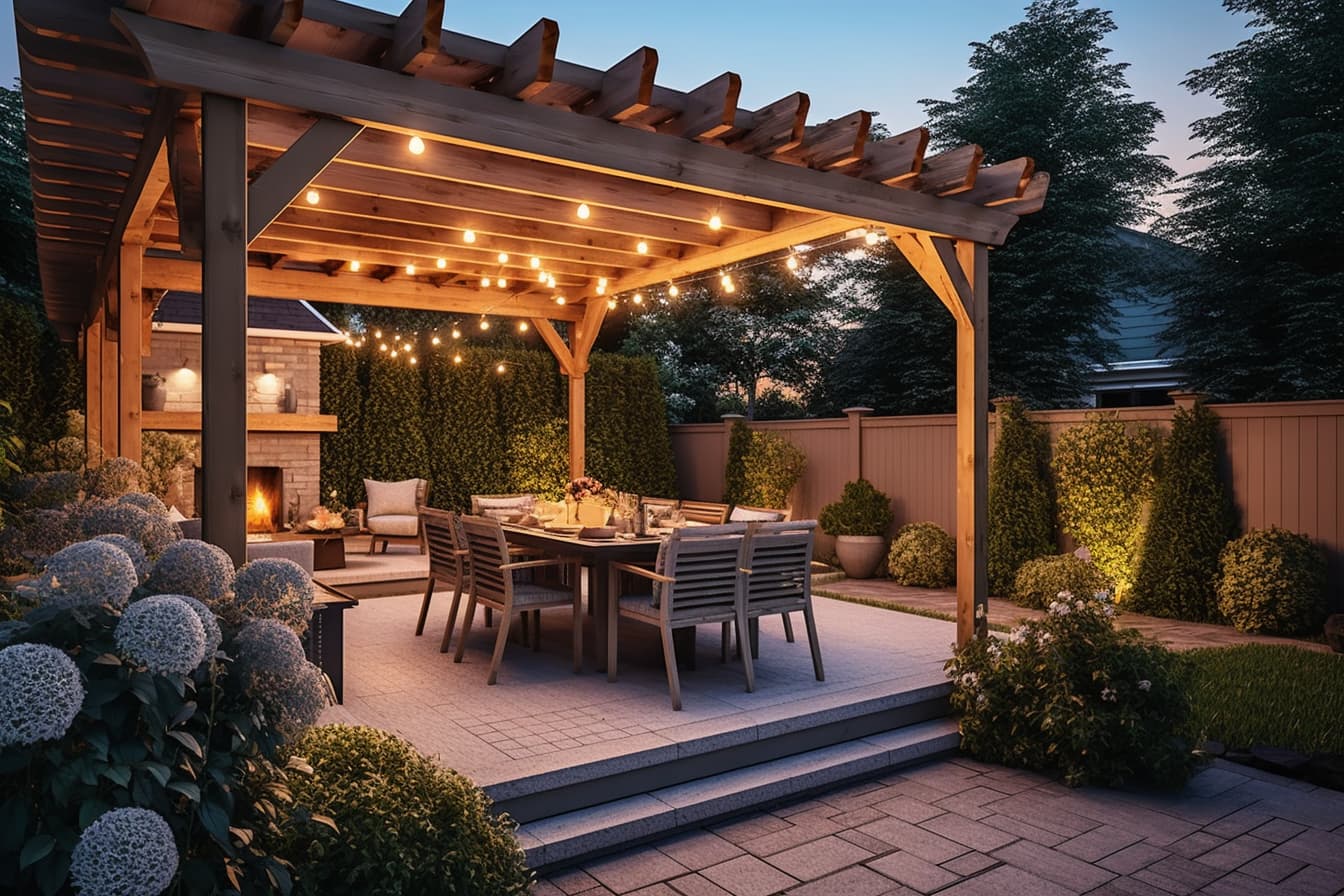
If you’re looking to up your patio game, consider a pergola patio cover. It’s essentially a framework of vertical posts and crossbeams that lets the sun filter through, creating a dappled light effect.
You can even get creative and add some climbing plants to create a natural canopy.
A pergola patio cover can range between $2,500 and $11,400, with customized covers over a larger area belonging to the higher end of the scale.
You can use a pergola patio cover to create your outdoor living space, dining area, or hot tub enclosure. Just don’t be surprised if all your friends suddenly want to hang out at your place.
Louvered Cover
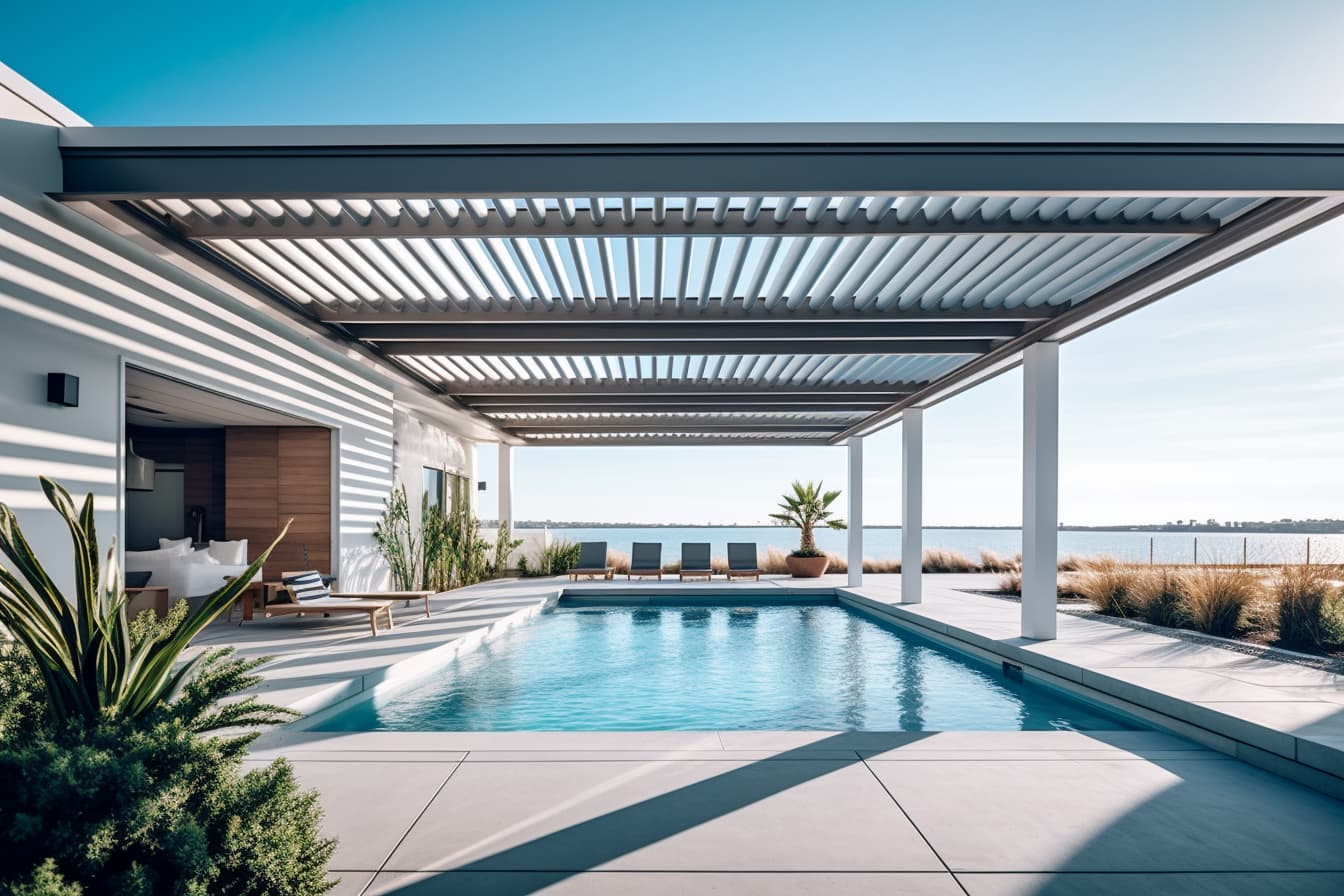
A louvered cover comes with adjustable louvers or slats that can be opened and closed.
These covers are usually made of aluminum or other durable materials that can hold up against harsh weather.
But let’s not forget the price—the cost of a louvered cover is anywhere between $4,300 and $26,100 (you’ll be paying more if you have a larger space and opt for top-quality aluminum materials).
With the ability to open and close the louvers, you can control the amount of sunlight and rain that enters your space.
Plus, they’re energy-efficient—by reducing the amount of direct sunlight that enters your home, you can keep your place cooler and save on your electric bill. It’s the perfect mix of form and function.
Gazebo cover
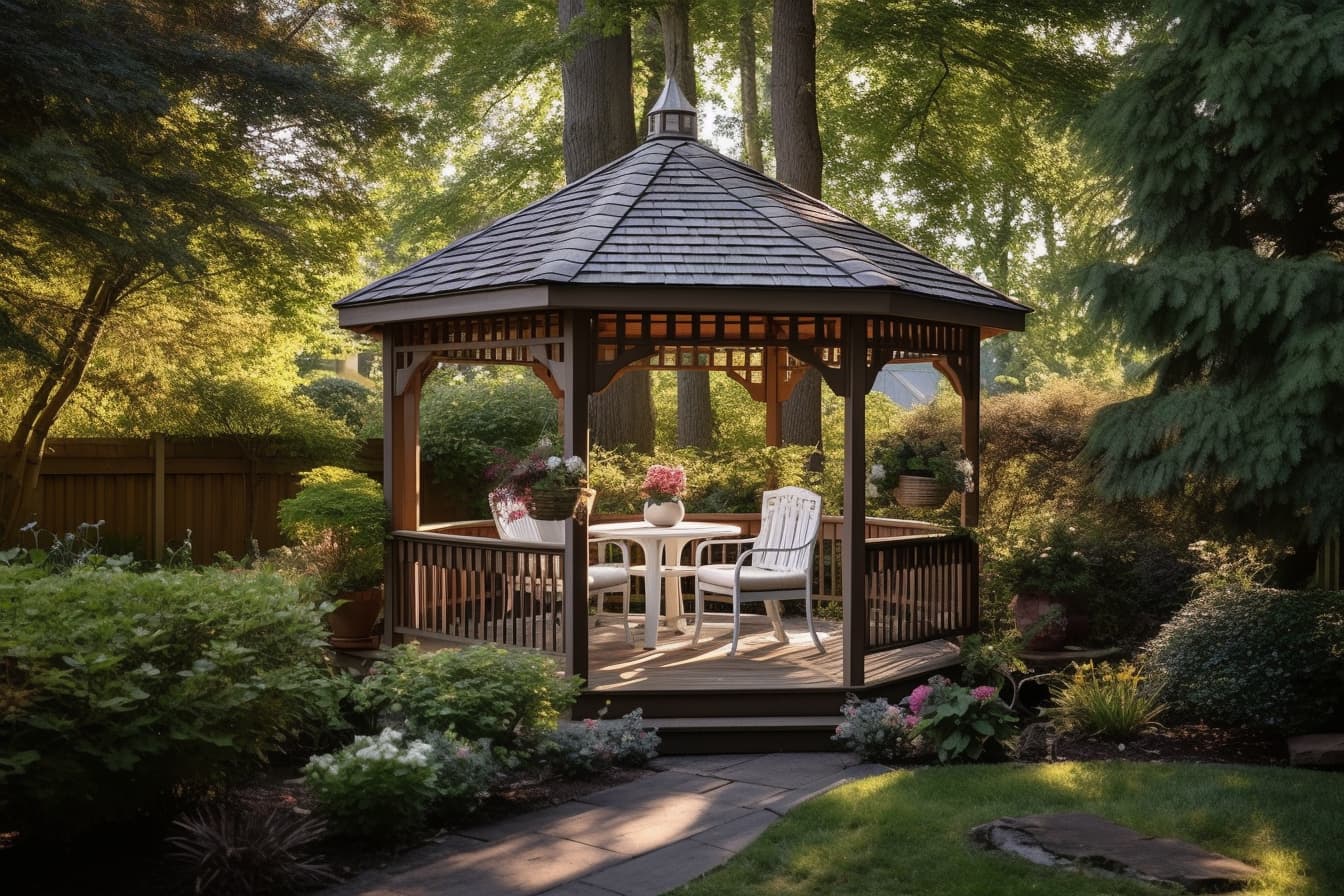
The gazebo patio cover is a freestanding, roofed structure with open sides.
Perfect for outdoor entertaining or just lounging, this patio cover can be made from a variety of materials like wood, metal, or vinyl.
A gazebo patio cover can range from $9,200 up to $15,400 if you opt for high-cost materials, like glass or aluminum, or have a bigger deck space.
Gazebo patio covers are pretty versatile and can offer shelter while still allowing fresh air to circulate.
With the right accessories, like lighting and curtains, you can create a cozy outdoor space to impress your guests.
Just remember to choose the right material for your climate and aesthetic, and make sure it’s properly designed and installed for safety and longevity.
Relevant: Everything You Need to Know About An Over the Garage Addition
Patio Roof Materials: Average Costs
So we’ve gone through the styles—but that’s not the only factor that can determine the cost.
You’ll also have to consider what materials you’re using and the size you’re working with when covering your patio.
Let’s break down the costs you can expect and see which material is the right fit for you:
|
Type |
Average cost |
Cost per sq ft |
|
Wood |
$5,000–$19,000 |
$15–$35 |
|
Aluminium |
$2,000–$10,000 |
$20–$70 |
|
Fabric |
$1,700–$2,870 |
$5–$16 |
|
Vinyl |
$2,500–$6,000 |
$5–$13 |
|
Glass |
$2,000–$30,000 |
$25–$45 |
*including materials and installation
These patio covers also work great for decking, creating some extra shading or adding a good dose of character to your outdoor space. Find out how much it costs to install garden decking. Now, back to patio covers—
Wood patio cover cost
The cost of a wooden patio cover typically ranges from $5,000 to $19,000 (or $15 to $35 per square foot).
These prices can change depending on the size of the cover, the quality of the wood used, and the complexity of the design.
We all know wood is durable, but the big benefit of a wooden patio cover is its aesthetic appeal.
It can add a natural and rustic look to your backyard, providing a warm and inviting atmosphere. It’s also a great investment as it can increase the overall value of your property.
Just remember, with great style comes great responsibility—wooden patio covers require maintenance over time, which includes cleaning, staining, and weatherproofing.
Aluminum patio cover cost
Aluminum patio cover costs usually sit around $2,000 to $10,000 (or $20 to $70 per square foot).
The price can vary based on size, the thickness of the aluminum, and any additional features like lighting or fans.
Unlike wood, aluminum won’t rot, rust, or require endless painting sessions. Plus, aluminum patio covers provide plenty of shade.
And don’t worry, desert dwellers—while aluminum may conduct heat, it can also reflect sunlight, making them a great option for keeping your backyard cool and comfortable.
Fabric patio cover cost
Fabric (or canvas) patio covers are customizable, adjustable, and oh-so-breezy.
This low-cost option ranges from $1,700 to $2,870 (or $5 to $16 per square foot).
But the real perk? Fabric patio covers can be easily adjusted to fit your needs, whether you need more or less sun and rain.
And with durable and waterproof materials, these covers can withstand a good storm or two.
However, the fabric can also fade or become damaged from exposure to the elements over time.
And if not properly looked after, it can develop mold or mildew, which can be stubborn to remove.
So before you commit to a fabric patio cover—think about if it’ll be a match for your climate or just a complete washout.
Vinyl patio cover cost
Vinyl patio cover costs are also on the cheap side, ranging from $2,500 to $6,000 (or $5 to $13 per square foot).
You won’t need to fork out much extra for maintenance either, as vinyl won’t rot or need any major touch-ups.
And let’s not forget the all-important shade factor, as vinyl patio covers can easily cool down your outdoor living area.
Just a heads up—while vinyl is a durable material, it might not be as strong as others like aluminum or steel, which could make it more vulnerable to damage in extreme weather conditions.
Glass patio cover cost
If you’re starting from scratch, you might need to cough up around $30,000 (or $25 to $45 per square foot).
But if you’re working with an existing structure and need to make some changes, it can cost a much lower $2,000.
Glass-covered patios give you a chance to be at one with nature—minus the bugs and the rain pouring down on you.
It’s a great choice for those who want an unobstructed view to make the most out of all those hours spent picking and pruning the backyard.
But before you grab your checkbook, there are a few potential downsides to think about.
Building a glass patio can be costly and is one of the most expensive patio cover materials. Plus, keeping it clean means regular maintenance and possibly even the help of a professional.
And let’s not forget about the heat—glass patios can trap heat in the summer, making outdoor spaces uncomfortably warm.
But if that’s an issue—you can always add fans or blinds to keep you cool (unless you enjoy basking in the sun).
If you want to go even bigger—find out the cost to build a 1,500 square foot house.
What Type of Patio Is Best?
Choosing the best type of patio for your home is like choosing your favorite ice cream flavor—it all depends on your taste and needs.
If you’re into a natural and rustic look, wooden patios could be the right pick for you—just be prepared to shell out some cash and do some regular maintenance.
For those who prefer low-maintenance options, aluminum and vinyl patios are the way to go—they’re durable and come in various styles and colors but may lack the customization of other materials.
And if you’re all about flexibility, fabric patio covers are a great choice—just don’t forget the extra maintenance and cleaning.
Lastly, if you want to enjoy the outdoors all year round with a beautiful view to boot, glass-covered patios are the cream of the crop.
No matter which patio option you choose, make sure to consider your budget, preferences, and local weather conditions. And don’t skimp on safety and longevity—make sure your patio is properly designed and installed.
What is a good size for a patio?
A good size for a patio depends on your preferences and the amount of space you have available.
A general rule of thumb is to aim for a patio with at least 25 square feet per person.
This is ideal if you want a comfortable seating area and room for a grill or fire pit. But if you’re planning to party like it’s 1999, you might want to consider a larger patio for your guests or to show off your dance moves.
Keep in mind your backyard layout and features (like the landscaping or garden beds) while figuring out the patio size.
Adding a pergola or shade structure can also provide shelter from the sun while adding extra decor.
Having a bigger patio can be pricey, so calculate those numbers carefully.
And if you’re on a budget, remember having a small patio space can offer a cozy area if properly sized and designed.
What’s the best patio location?
The best patio location will depend on a few key factors, so let’s break it down:
- Privacy: Do you want your patio to be visible from the street or neighboring houses? If not, consider installing it in the back of your yard or building a fully enclosed patio.
- Sun exposure: If you’re a sun-lover, consider a south-facing location—but if you prefer shade, a north-facing location might be best.
- House proximity: Do you like being close to the kitchen for easy access to drinks and snacks? Or maybe you want it closer to your pool or garden? Make sure to consider any electrical or water needs as well.
- View: Think about what you want to see from your patio. Do you have a beautiful garden that you want to showcase or a stunning view of the city skyline? Take this into account when picking a location.
Cheap Patio Roof Ideas
Building a patio and being frugal don’t exactly go hand-in-hand, but there are plenty of ways you can cut costs.
It’s always a good idea to look out for budget-friendly options like concrete and gravel, which tend to be more affordable than natural stone or brick. Take the time to shop around and look at different prices before swiping your card.
Installation costs can also quickly add up, so don’t just settle for the first quote you receive—compare prices from multiple suppliers to find the best deal.
And if you want to keep costs down while being eco-conscious, you could use recycled or repurposed materials like old bricks or railroad ties to save money and add character to your patio.
What’s the cheapest patio material?
Who says you need to spend the big bucks to create a top-notch deck?
Here are some of the cheapest patio materials that can still deliver enviable results:
- Fabric cover ($5–$16 per sq ft): This flexible patio cover can add versatility to your outdoor space, allowing you to adjust for the sun and rain while keeping it low budget.
- Vinyl cover ($5–$13 per sq ft): A vinyl patio cover is pretty low-maintenance, making it a long-lasting and cost-friendly option. It also comes in various styles, so you can choose a design that fits your aesthetic.
- Gravel flooring ($5–$10 per sq ft): Gravel patios are easy to install, require little maintenance, and provide good drainage. But for those who like keeping it classy, you might want to skip the high heels.
- Concrete slabs ($6–$10 per sq ft): Concrete patios are a cost-effective option while also being durable and low-maintenance. Consider using the cash you save on adding a decorative finish or staining to jazz up the look.
Trying to be more frugal? Take a look at our budget planners.
High-Cost Roof Ideas
Outdoor patios can be the perfect setting for parties, BBQs, and curling up to stargaze—so if you want to spend lavishly here, we don’t blame you.
It all starts with choosing high-end materials that are built to last and will elevate the look of your space—natural stone, brick, and tile are all great options.
And to really step it up, think about adding custom features that will make your patio stand out.
You can also add some pizzazz to your space with an outdoor kitchen, a fire pit, or even a water feature—these custom additions are sure to impress your guests and provide both style and function.
And if you’re not confident in your DIY skills, consider hiring a professional to help with the project.
A landscape designer or architect can help bring your vision to life and ensure that you get to enjoy the lap of luxury in your own backyard.
Kerrie Kelly, CEO & Creative Director for Kerrie Kelly Studio, also gave us some top tips, “Achieve a luxury patio with upscale furnishings, beautiful landscaping, and cozy amenities. A well-designed patio can enhance your home’s value and offer an inviting outdoor oasis for years to come.”
What are the high-end patio materials?
Here are some luxury patio options that will help you create those special memories:
- Glass cover ($25–$45 per sq ft): A glass patio cover offers year-round outdoor use with an unobstructed view of your surroundings. It is a high-end option that adds value to your property (just don’t forget the cleaning costs).
- Wood cover ($15–$35 per sq ft): You can add some elegance to your outdoor space with a wood cover, adding warmth and character. It’s a durable option but needs regular maintenance and can be more expensive than other materials.
- Natural stone ($10–$40 per sq ft): Natural stone patios are a beautiful and durable option—they come in a variety of colors and patterns. But even if you have the cash to spare, just watch out for the pricey installation costs.
- Porcelain tiles ($15–$30 per sq ft): Tile patios are a high-end option and can provide a sleek and modern look. Porcelain can also withstand harsh weather conditions as they are designed to be thick and sturdy.
DIY Patio Covers
Labor and installation costs can range from $25 to $40 per square foot, so some DIY could save you thousands (depending on the materials and accessories you choose).
But unless you want your patio to collapse while you’re curled up reading a book, you’ll want to do your research beforehand and make sure you plan every single detail.
How to build a patio?
There’s nothing like rolling up your sleeves and getting your hands dirty (depending on who you ask).
Building a patio yourself can be a fun and rewarding project, but be prepared to do some heavy lifting and research.
Here are some basic steps to get you started:
- Plan your patio: Figure out the size and location of your patio, and decide on the materials you’ll need. Make sure to check local building codes and get hold of any necessary permits.
- Prepare the area: Clear the area of any grass, weeds, or debris. Level the ground and add a layer of sand or gravel to the space.
- Build the frame: Use wooden stakes and string to mark the outline of your patio. Build a frame using lumber or metal edging, and make sure it’s level and square.
- Add a base: Add a layer of crushed gravel or sand to the frame, and use a tamper to compact it.
- Lay the patio material: Depending on the material you chose, lay the patio material in the desired pattern. Make sure to carefully follow the manufacturer’s instructions when installing.
- Add finishing touches: Once the patio material is in place, add any finishing touches like a border, seating wall, or fire pit.
Of course, these are just basic steps, and the process can be smooth sailing or choppy depending on the size of your space and the complexity of your patio design.
To give yourself the best chance for success, do lots of research and have a solid plan before getting stuck in—no matter how DIY-savvy you are.
How to build a covered patio attached to a house
Like building a standard patio, you’ll need to check that your project meets local building codes.
Once you’ve got the green light, start planning the size, measurements, and materials you’ll need.
Clear the area of any grass, weeds, or debris so you can level the ground, then build a frame and add a layer of crushed gravel or sand as a base.
From there, lay the patio material, and follow the instructions for installation.
To attach the patio to your house, you’ll need to create a ledger board—a horizontal board that’s attached to the house and supports the weight of the patio.
Make sure you use the right hardware and follow the best practices when attaching the board.
Here’s a rundown of how to build a basic patio if you’re interested in embracing your inner handyman.
Does a Covered Patio Increase the Value of Your Home?
Yes, a covered patio can absolutely bring value to your home—and is a great investment if you plan to sell in the future.
A 2019 survey discovered that a new patio costing $3,269 to build would bring a $3,563 increase in value or a 109% return on investment.
More research into homebuyer preferences found that having a patio made it into the top five (out of 200) most wanted features in a home—with 82% saying it was desirable or essential.
Interested in investment returns that aren’t future build projects? Check out our investment page.
Key Takeaways
- Building a covered patio can cost from $2,000 to $30,000, including materials and installation.
- Different patio styles can range in price, with pergolas, gazebos, and awnings on the cheaper side, depending on the size of your patio.
- Budget patio roof materials include fabric and vinyl, while glass and aluminum can be more expensive.
- You can also save $25 to $40 per square foot on labor costs by doing some patio DIY—just make sure you do your research and make a solid plan before getting stuck in.
FAQ
What’s the cheapest way to build a patio?
If you’re on a tight budget, research cost-friendly materials like gravel, concrete, and fabric coverings while shopping around for the best prices.
There are also plenty of recycled or repurposed materials available that could add character to your space.
Consider starting small and building your patio in stages—begin with a small seating area and keep adding on over time.
You could even do the project yourself instead of hiring a contractor—just be sure to do your research and have a detailed plan in place before diving in.
Use our spending comparison spreadsheet to monitor your expenses.
What’s the labor cost to build a deck?
Adding a roof to a patio can start from $25 to $40 per square foot.
These costs can cover planning, design, and installation—but some materials and styles will cause the price to rise.
For example, expensive and intricate flooring such as natural stone and tiles may take longer to install and require more expertise.
Glass patios are also much more expensive to install than other materials, such as fabric or vinyl covers. So if you want to save money on labor, consider using low-cost materials that are easier to install, or reduce the size of your deck.
Use our free monthly budget calculator to keep track of your costs.
How much does it cost to build a 20×20 deck?
On average, you can expect to pay between $2,000 and $6,800 for a 20×20 deck. But this can change depending on the style of the patio and the materials you choose.
For example, if you opt for an awning patio with a fabric cover and gravel flooring, you’re probably going to be on the lower end of the price scale. But if you want to add some luxury with glass walls and porcelain tiles, you could be paying much more—with costs even going up to $30,000.
If you want to save money, try looking for second-hand materials and accessories, or do some of the easier tasks yourself if you’re feeling confident.
Want to add more to your home? Here’s everything to know about an over-the-garage extension.
How to build a roof over a deck?
To build a roof over a deck, follow these steps:
- Check local building codes for permits and requirements.
- Determine the size, style, and material of the roof.
- Install support posts and a ledger board onto the deck.
- Install the rafters and beams.
- Install plywood sheathing and roofing material.
- Add gutters, downspouts, and flashing.
A roof will provide shade, shelter and increase the value of your home. The cost of building a roof over a deck can range from $1,000 to $30,000, depending on the size and materials used.
Building a roof over your deck takes careful planning and attention to detail, so consider hiring a professional if you’re not confident in your DIY skills.
Take a look at our budget planners to keep your costs under control.
How much is a metal patio awning?
Metal awnings can range from $1,800–$27,400, including materials and installation costs.
Here are the costs per square foot that you can expect from different awning materials:
- Steel: $10–$35
- Copper: $90–$120
- Aluminum: $5–$15
Costs can also range depending on the style you choose, such as traditional, open traditional, canopy, or bullnose.
You can also consider other styles of patio roofs, like gazebos, pergolas, or gabled roofs.
How to build a covered porch?
To add a cover to your porch, follow these steps:
- Determine the size and style of the cover.
- Install support posts on the porch using hardware.
- Install the header beam onto the support posts.
- Install the rafters onto the header beam.
- Add plywood sheathing and roofing material onto the rafters.
- Add gutters, downspouts, and flashing to keep water away from the porch.
Keep in mind that costs can vary depending on the size, materials, and features of your porch.
It’s also important to have a solid plan and get any necessary permits before beginning any construction (you don’t want to tear down everything you’ve built).
How to cover a deck with a roof?
First, you’ll need to decide on the type of roof that best suits your needs and matches your home’s architecture.
When it comes to actually building the roof, it’s important to ensure proper structural support. It’s best to get help from a professional contractor or engineer to assess your deck’s load-bearing capacity and determine if any changes are necessary to support the added weight of the roof.
Once the structure is sorted out, you can select the materials for your roof. Depending on the chosen roof type, you might work with roofing materials like shingles, tiles, or even metal sheets.
It’s always a good idea to select high-quality, durable materials that can withstand the weather conditions in your area.


